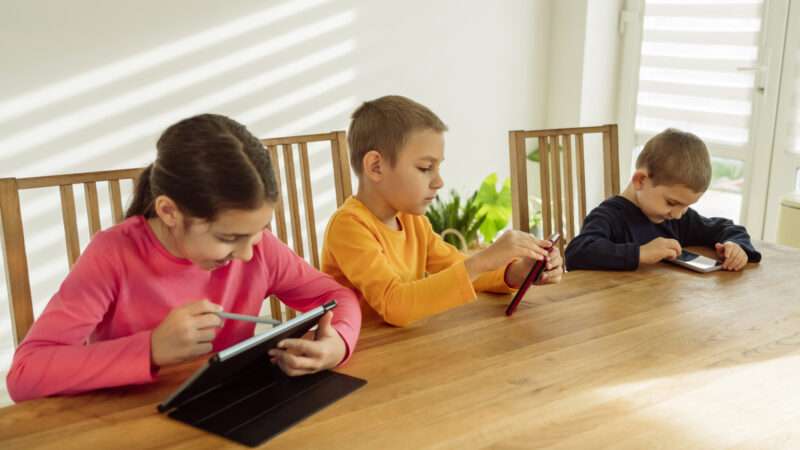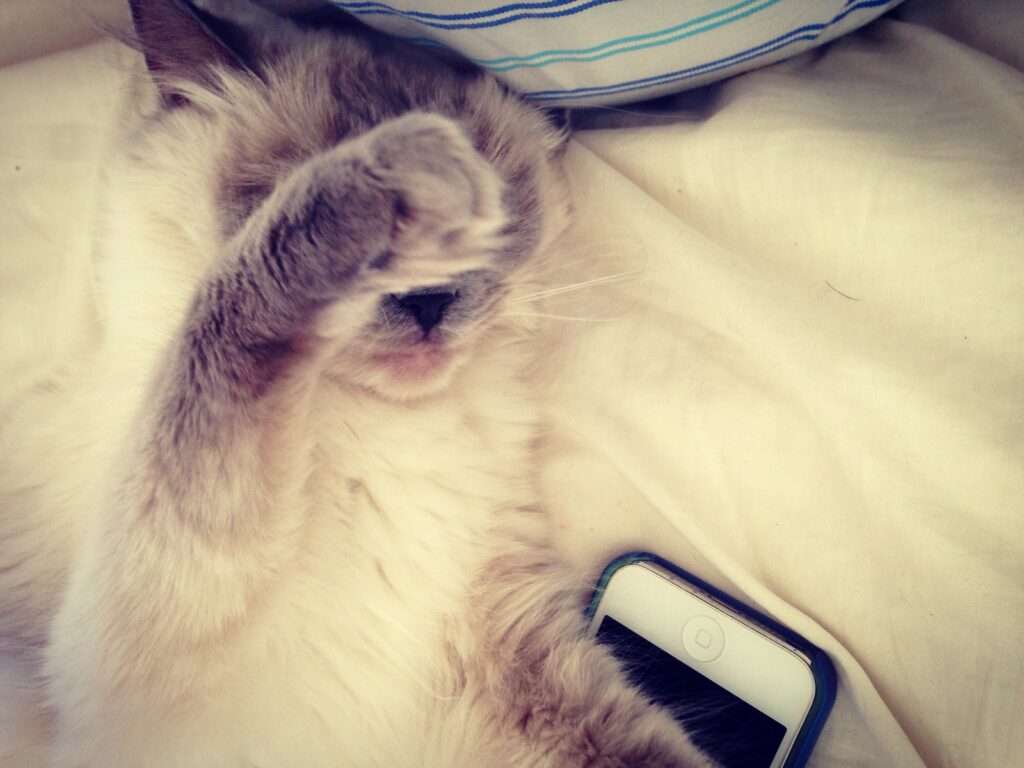Parents, Not Lax Regulation, To Blame for Tweens' Excessive Screen Time

Instead of calling on the federal government to regulate tween and teen use of social media, perhaps we should look a little closer to home. A new study suggests parental policies and habits around screens are a significant predictor of problematic use among adolescents.
One major finding: Kids getting too much “screen time” are more likely to have parents who get too much screen time.
“One of the biggest predictors of adolescents’ screen use is their parents’ screen use,” pediatrician and lead study author Jason Nagata told The Washington Post.
‘Associations Between Media Parenting Practices and Early Adolescent Screen Use’
This was a massive study looking at the screen habits of more than 10,000 kids ages 12 and 13. Published in the journal Pediatric Research, the study—”Associations between media parenting practices and early adolescent screen use”—looked at how often parents used cellphones or other screens around their kids and family policies surrounding technology, such as whether screens were often employed during meal times (35.6 percent said yes), whether kids had access to screens in their bedrooms (46.2 percent said yes), and whether parents monitored and/or limited screen time during the week (67.4 percent and 76.2 percent said yes). Researchers also examined how often the children of these parents engaged in tech-based activities (including using social media, playing video games, and being on a cell phone generally) and how this affected various aspects of their lives.
The researchers found that “parent screen use, family mealtime screen use, and bedroom screen use were associated with greater adolescent screen time and problematic social media, video game, and mobile phone use.”
In addition, “parental use of screens to control behavior (e.g., as a reward or punishment) was associated with higher screen time and greater problematic video game use.”
On the flip side, “parental monitoring of screens was associated with lower screen time and less problematic social media and mobile phone use,” and “parental limit setting of screens was associated with lower screen time and less problematic social media, video game, and mobile phone use.”
Challenging Conventional Wisdom
The findings challenge several prominent ideas in the teens and tech space, including the idea that parents are powerless to influence their children’s screen-time habits. That alleged parental powerlessness is often offered as a reason for regulating digital spaces by setting age minimums for joining social media sites and banning “addictive” features like algorithmic feeds and endless scrolling.
Likewise, the study challenges the idea that tween and teen peers are the main influence on their screen habits, suggesting that parental habits as well as family policies around screens can have a significant—maybe more significant—effect.
There are various ways in which this influence could work.
Perhaps ample screen time by parents has an instructive influence, normalizing the idea that it’s OK to be on one’s phone or computer all the time. Perhaps parents who use screens a lot are just more permissive of kids’ screen use. Perhaps excessive childhood screen time is spawned as a response to a lack of attention or guardrails from parents who are enmeshed in their own screens.
In any event, the findings “were consistent with various prior studies, which have suggested that greater parental screen time use is associated with greater screen time in younger children and more frequent co-use of screens with children,” note the researchers.
A Missing Link in the Mental Health Puzzle?
The new findings could also represent a missing piece of the puzzle when it comes to technology and youth mental health.
There are a lot of folks intent on blaming social media—or screens more broadly—for a rise in teen mental health issues. Megan Moreno, co-director of the American Academy of Pediatrics Center of Excellence on Social Media and Youth Mental Health, told the Post that the message about social media and mental health has spread “almost to the edge of moral panic” despite the fact that the evidence “hasn’t been there.”
Part of the trouble with these “tech makes teens sad/anxious/etc.” narratives is that they tend to ignore other explanations for rises in self-reported symptoms, self-harm activities, or mental illness diagnoses. The other big issue is that they look at links between symptoms and screen usage and simply assume the direction of causality, positing that too much screen time causes social, psychiatric, or behavioral problems when it’s possible that existing problems lead some kids to turn to screens as an escape.
If kids who spend too much time on screens also have parents who spend too much time on screens, that could suggest other mechanisms for the mental health and screen time association.
Parents who find themselves susceptible to addiction-like behavior with screens may possess some genetic traits that their offspring share, predisposing both to problematic tech use.
Ample parental screen time could mean a parent has a heavy workload that leaves too little time for their kids, and this lack of parental investment could lead to both mental or behavioral problems and a lot of screen time.
Or perhaps too much parental phone use signifies a sort of parenting style that spawns various negative issues with children.
Any or all of the above scenarios seems plausible and posits a link between screen time and mental health issues that goes beyond the simplistic idea that using social media or smartphones directly triggers depression and anxiety.
More Sex & Tech News
• Performative anti-tech antics hit a new low, with the U.S. surgeon general calling for “warning labels” on social media.
• In Ghana and some other African countries, improved access to long-acting contraception “results in tangible gains for women,” reports The New York Times. “At a bustling MSI clinic in the town of Kumasi, Faustina Saahene, who runs the operation, said women from the country’s large Muslim minority appreciate implants and IUDs for their discretion, which allows them to space their pregnancies without openly challenging husbands who want them to have a lot of children.”
• The misleadingly named American Innovation and Competition Online Act may be coming back soon. The bill would block big tech companies from “self-preferencing,” potentially banning things like Google Maps results coming up top in Google searches or Amazon offering free shipping on Amazon-brand products.
• How Republicans are fighting reproductive rights ballot initiatives.
• Paul Nakasone, a former director of the National Security Administration, has been appointed to the board of OpenAI. Edward Snowden has thoughts:
They’ve gone full mask-off: ???????? ???????????? ???????????????? trust @OpenAI or its products (ChatGPT etc). There is only one reason for appointing an @NSAGov Director to your board. This is a willful, calculated betrayal of the rights of every person on Earth. You have been warned. https://t.co/bzHcOYvtko
— Edward Snowden (@Snowden) June 14, 2024
• “TikTok lifted this family out of public housing,” reports The Washington Post. “But this could all change if the law Congress passed in April ultimately leads to a TikTok ban across the United States.”
Today’s Image

The post Parents, Not Lax Regulation, To Blame for Tweens’ Excessive Screen Time appeared first on Reason.com.
Source: https://reason.com/2024/06/17/parents-not-lax-regulation-to-blame-for-tweens-excessive-screen-time/
Anyone can join.
Anyone can contribute.
Anyone can become informed about their world.
"United We Stand" Click Here To Create Your Personal Citizen Journalist Account Today, Be Sure To Invite Your Friends.
Humic & Fulvic Liquid Trace Mineral Complex
HerbAnomic’s Humic and Fulvic Liquid Trace Mineral Complex is a revolutionary New Humic and Fulvic Acid Complex designed to support your body at the cellular level. Our product has been thoroughly tested by an ISO/IEC Certified Lab for toxins and Heavy metals as well as for trace mineral content. We KNOW we have NO lead, arsenic, mercury, aluminum etc. in our Formula. This Humic & Fulvic Liquid Trace Mineral complex has high trace levels of naturally occurring Humic and Fulvic Acids as well as high trace levels of Zinc, Iron, Magnesium, Molybdenum, Potassium and more. There is a wide range of up to 70 trace minerals which occur naturally in our Complex at varying levels. We Choose to list the 8 substances which occur in higher trace levels on our supplement panel. We don’t claim a high number of minerals as other Humic and Fulvic Supplements do and leave you to guess which elements you’ll be getting. Order Your Humic Fulvic for Your Family by Clicking on this Link , or the Banner Below.
Our Formula is an exceptional value compared to other Humic Fulvic Minerals because...
It’s OXYGENATED
It Always Tests at 9.5+ pH
Preservative and Chemical Free
Allergen Free
Comes From a Pure, Unpolluted, Organic Source
Is an Excellent Source for Trace Minerals
Is From Whole, Prehisoric Plant Based Origin Material With Ionic Minerals and Constituents
Highly Conductive/Full of Extra Electrons
Is a Full Spectrum Complex
Our Humic and Fulvic Liquid Trace Mineral Complex has Minerals, Amino Acids, Poly Electrolytes, Phytochemicals, Polyphenols, Bioflavonoids and Trace Vitamins included with the Humic and Fulvic Acid. Our Source material is high in these constituents, where other manufacturers use inferior materials.
Try Our Humic and Fulvic Liquid Trace Mineral Complex today. Order Yours Today by Following This Link.






